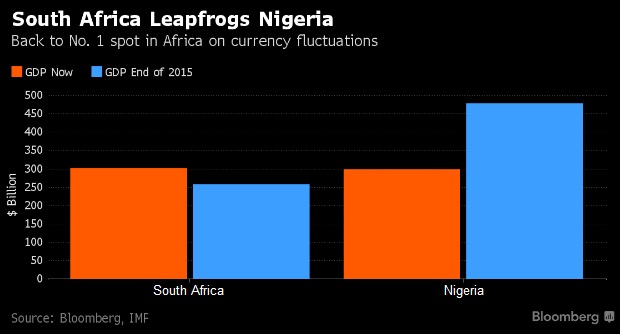News
South Africa’s economy regains rank as Africa’s biggest on Rand

South Africa’s economy regained the position of Africa’s largest in dollar terms more than two years after losing it to Nigeria as the value of the nations’ currencies moved in opposite directions.
Based on gross domestic product at the end of 2015 published by the International Monetary Fund, the size of South Africa’s economy is $301 billion at the rand’s current exchange rate, while Nigeria’s GDP is $296 billion. That’s after the rand gained more than 16 percent against the dollar since the start of 2016, and Nigeria’s naira lost more than a third of its value after the central bank removed a currency peg in June.
Both nations face the risk of a recession after contracting in the first quarter of the year. The Nigerian economy shrank by 0.4 percent in the three months through March from a year earlier amid low oil prices and output and shortage of foreign currency. That curbed imports, including fuel. In South Africa, GDP contracted by 0.2 percent from a year earlier as farming and mining output declined.
“More than the growth outlook, in the short term the ranking of these economies is likely to be determined by exchange rate movements,” Alan Cameron, an economist at Exotix Partners LLP, said in e-mailed responses to questions on Aug. 2. Although Nigeria is unlikely to be unseated as Africa’s largest economy in the long run, “the momentum that took it there in the first place is now long gone.”

No Growth
The South African rand rallied as investors turned to emerging markets with liquid capital markets to seek returns after Britain voted to leave the European Union on June 23, even as the central bank forecast the economy won’t expand this year and the nation risks losing its investment-grade credit rating. The ruling African National Congress’s lowest support since 1994 in the Aug. 3 local government vote led to further gains on speculation that it will pressure the party to introduce economic reforms that will boost growth and cut unemployment.
In Nigeria, investors didn’t flock to buy naira-based assets after authorities removed the peg of 197-199 naira per dollar. The Central Bank of Nigeria raised its benchmark interest rate to a record in July to lure foreign money, even as the IMF forecast the economy will contract 1.8 percent this year.
Nigeria was assessed as the continent’s largest economy in April 2014 when authorities in the West African nation overhauled their GDP data for the first time in two decades. The recalculation saw the Nigerian economy in 2013 expand by three-quarters to an estimated 80 trillion naira.
The rand weakened 0.4 percent to 13.3323 per dollar at 7:56 a.m. in Johannesburg on Thursday, ending three days of gains. The naira dropped 0.4 percent to 321.50 per dollar, heading for a record low on a closing basis.
Nigeria’s economy still number one in Africa – Dangote
The President of Dangote Group and Africa’s richest man, Aliko Dangote has said Nigeria remains the number one economy in Africa, despite recent economic challenges.
Speaking at the 2016 Presidential Policy Dialogue session, organised by the Lagos Chamber of Commerce and Industry Dangote said he is optimistic that Nigeria will soon overcome the challenges and remain stronger.
According to him the problem with the economy did not start with this current administration while he maintains faith that the country is still the best place to invest.
On Wednesday, Bloomberg reported that South Africa has now overtaken Nigeria to regain its position as Africa’s largest economy due to the continued depreciation of the naira against the dollar.
The news agency used the data by the International Monetary Fund (IMF) that as at the end of 2015, the size of South Africa’s economy was $301 billion at the rand’s current exchange rate, while Nigeria’s GDP stood at $296 billion.
In dollar terms, South Africa has emerged as Africa’s biggest economy more than two years after losing it to Nigeria largely due to dwindling value of the naira against the dollar.
The rand had gained more than 16 percent against the dollar since the start of 2016, and Nigeria’s naira lost more than a third of its value after the Central Bank of Nigeria (CBN) introduced a foreign exchange liberalisation allowing market forces to determine the value of the local currency against the dollar.
Analysts at the Lagos-based financial services firm, Cordros Capital, said Nigeria’s GDP fell short of South Africa’s primarily as a result of Nigeria’s inability to control the value of the naira.
To reverse the trend in the immediate, the analysts, said the naira would have to reverse its losses against the USD.
“To reverse its loss against the USD, the NGN would have to close N197 by Q4 2016, which is highly unlikely.”
They further said the possibility of naira reversing its losses against the dollar may well broadly depend on the decisions of both the monetary and fiscal authorities.
“In the long term, economic activities would have to return to the pre-recession levels, wherein growth per annum was in excess of 5 per cent,” they said.
Speaking on the development, Dr. Sale Ahmed, blamed the development on Nigeria running an oil-based economy.
“South Africa continues to strengthen its financial regulatory institutions, its production and manufacturing base,” he said.




